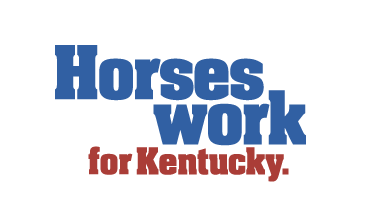Second Round of COVID-19 Kentucky Equine Business Impact Survey is Underway
The survey is a collaboration between KEEP and the University of Louisville Equine Industry Program
LEXINGTON, Ky. (Tuesday, June 30, 2020) – The Kentucky Equine Education Project (KEEP) and the University of Louisville (UofL) Equine Industry Program jointly announced the release of the second round of their COVID-19 Kentucky Equine Business Impact Survey. The survey will be shared with employers throughout Kentucky’s horse industry and community to further capture the impacts of the pandemic on the Commonwealth’s signature industry.
The second round of the COVID-19 Kentucky Equine Business Impact Survey is now open for responses and will close on July 13, 2020. The survey can be found here.
The previous survey, which was conducted in May, showed that the pandemic had greatly impacted Kentucky’s equine businesses resulting in employers cutting costs and postponing capital improvement projects. However, the survey indicated that the vast majority of respondents did not have to lay off employees.
Since the last survey, horse racing has resumed in Kentucky, although without spectators, and historical horse racing facilities have reopened with limited capacity. The second round of the COVID-19 Kentucky Equine Business Impact Survey will capture how this is impacting the equine businesses across the state.
Survey participants will not be identified in the published results.
Elisabeth Jensen, KEEP’s Executive Vice President who oversees the daily operations of the organization, commented, “Since we completed our first survey in May, the state has lifted some of the restrictions on the horse industry, which should provide a boost to equine business across the state. However, we have yet to see the impact of how the pandemic is affecting horse sales and what that means for Kentucky’s equine economy.” Jensen continued, “We hope that this second round of our survey can, when combined with the data from our May survey, paint a clearer picture of the challenges the industry will face.”
“The UofL Equine Industry Program’s goal is to educate and train the next generation of leaders for Kentucky’s signature industry,” said Sean Beirne, Director of the Equine Industry Program. “The COVID-19 Kentucky Equine Business Impact Survey provides us with an incredible up-to-the-moment view of the challenges that the industry will face in the coming years. In addition to helping inform policy-makers on the status of the industry, we can also use this data to prepare our students for the challenges of the industry they will be entering.”
ABOUT KEEP
The Kentucky Equine Education Project, Kentucky’s equine economic advocate, is a not-for-profit grassroots organization created in 2004 to preserve, promote and protect Kentucky’s signature multi-breed horse industry. KEEP is committed to ensuring Kentucky remains the horse capital of the world, including educating Kentuckians and elected officials of the importance of the horse industry to the state. KEEP was the driving force in the establishment of the Kentucky Breeders Incentive Fund, which has paid out more than $177 million to Kentucky breeders since its inception in 2006, and pari-mutuel wagering on historical horse racing, which has been responsible for more than $40 million to purses and more than $24 million to the Kentucky Thoroughbred Development Fund.
KEEP works to strengthen the horse economy in Kentucky through our statewide network of citizen advocates. To learn more about how you can become a member or support our work, please visit www.horseswork.com.
ABOUT THE EQUINE INDUSTRY PROGRAM, UNIVERSITY OF LOUISVILLE
The Equine Industry Program is on the move and a leader in horse commerce, enterprise and academics. It was established in 1986 and is supported by KRS (Kentucky Revised Statute) 230.550. As one of only two AACSB-accredited equine programs in the world, the Equine Industry Program provides training and educational opportunities in the horse racing industry relating to, but not limited to, finance, management, marketing, regulation, and administrative aspects of the horse racing industry.

Recent Comments